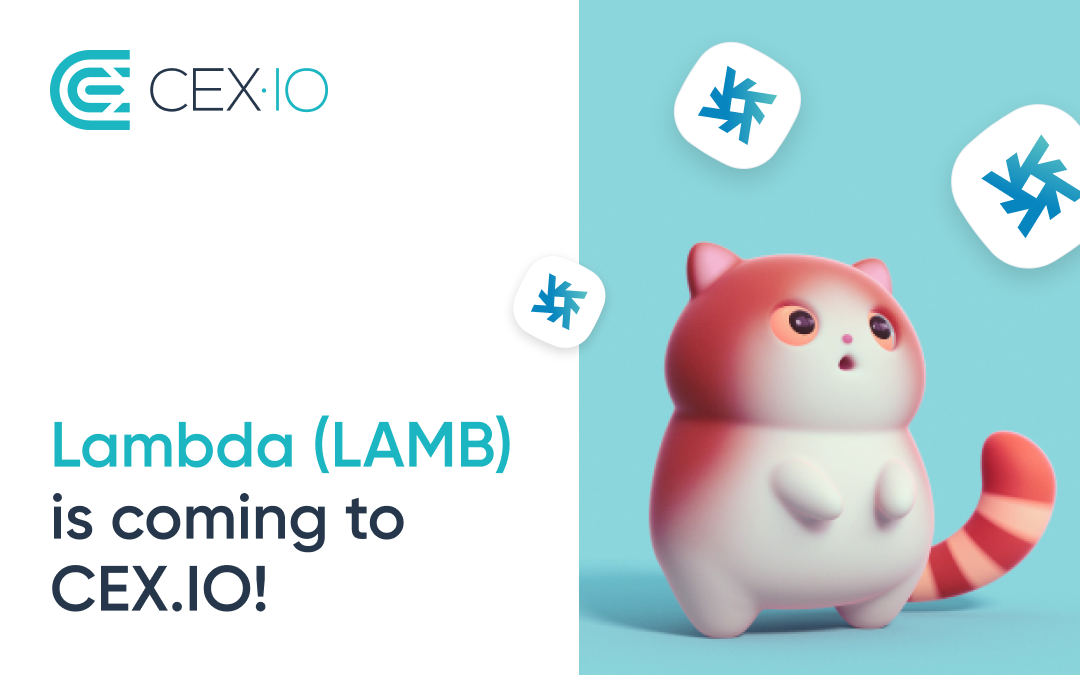We are working hard on extending the CEX.IO marketplace to provide more trading options for our customers. Lambda (LAMB) is the next coin we will be listing.
Starting September 22, you will be able to deposit LAMB and trade the LAMB/USD pair via the CEX.IO website and the CEX.IO mobile app.
On September 24, we will kick off LAMB withdrawals.
[button link=”https://cex.io/auth/login?utm_campaign=lambda_announce&utm_medium=post&utm_source=cex.io_blog” type=”big” newwindow=”yes”] Visit CEX.IO[/button]
📌 What are Lambda and LAMB?
Lambda is a blockchain infrastructure project. Its developers believe that Lambda is able to provide unlimited storage capacities. The project services include:
- multi-chain data sharing;
- cross-chain data management;
- data privacy protection;
- provable data ownership (PDP);
- and distributed intelligent computing.
Lambda uses a PoST (Proof of Space Time) consensus algorithm. It is a protocol between a storage provider and a verifier. With PoST, the storage provider tells the verifier that a specific file has been stored for a particular amount of time. The responsibility of the storage provider is to generate valid Proofs of Storage. After that, the storage provider gets a reward for storing data. For its part, validators ensure the integrity and security of data.
The Lambda coin (LAMB) is a digital currency in the Lambda network. Its total supply is limited to 10 billion tokens. LAMB is mostly used for mining and storage space trading. Also, service providers on the Lambda blockchain get the reward with LAMB tokens for completing tasks.
📌 What problem does Lambda solve?
Traditional database systems are usually managed by single institutions that have complete control over the whole system. As a decentralized storage network, Lambda provides storage and data management services for decentralized applications (dApps). It handles authorization, encryption, and communication between non-trusting parties.
In terms of business scenarios, Lambda is suitable for frequent transactions with large portions of data. In addition, the network can be used to store data for decentralized services.
📌 What is the innovation behind Lambda?
Lambda network performance is incomparable to the metrics of a centralized database. In brief, its computing capacity depends on the computing, storage, and bandwidth powers shared by miners.
In the crypto industry, the Lambda project provides incentives to reward miners. Moreover, it connects to a great number of devices and creates a low-cost distributed data storage and computing network.
The team behind Lambda claims that the main benefits of the network are its open source nature, community governance, and verifiable economy model. Thus, it can be used as:
- a key-value (KV) database (such as Redis),
- a document database (such as MongoDB),
- a time series database (TSDB).
📌 Ecosystem
The Lambda ecosystem consists of the following roles:
1) A chain node that provides routing, accounting, control, and encryption services. Chain nodes are further divided into validators, nominators, and phishers.
2) Storage nodes that regularly send heartbeat information to validators. With this data, validators get more chances to win a reward.
3) Users who are entities that use storage nodes and pay for services. Generally, these entities are other application chains and dApps.
4) The marketplace is an exchange where users can buy data storage space.
📌Adoption
Lambda mainly helps the financial industry to perform cold backups of important data. In particular, it maintains databases through the distributed storage of the Lambda intranet.
In the Lambda system, storage miners provide Proof of Space-Time (PoST) for the consensus network. Meanwhile, this protocol helps to generate proof sets on a regular basis. Because of this, Lambda is a cost-effective choice for distributed storage systems.
👉 Discuss Lambda in our official Telegram groups:
English: https://t.me/CEX_IO
Russian: https://t.me/CEXIORU
Note: LAMB is currently not available for US residents.
Disclaimer: The above content is for informational purposes only. You should not construe any such information or other materials as legal, tax, investment, financial, or other advice. Please study assets on your own before making any investment or trading decisions.
